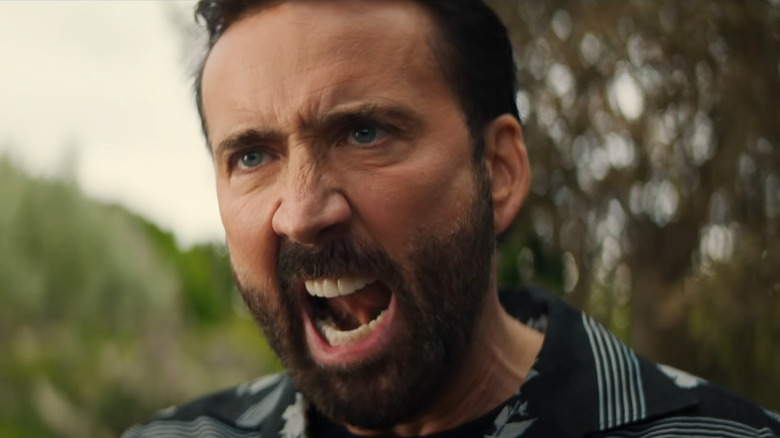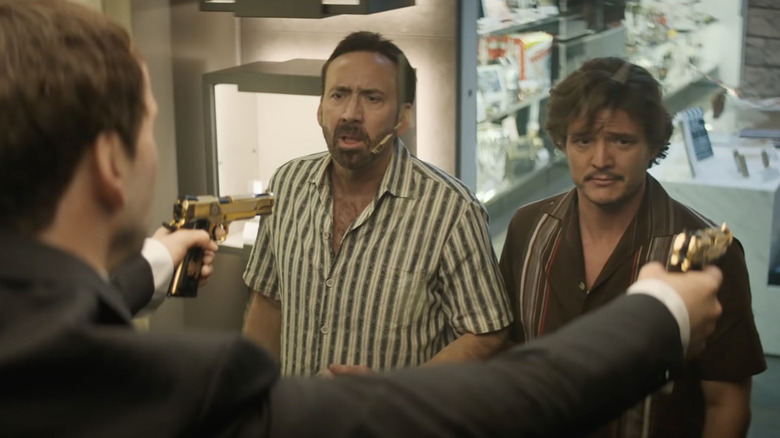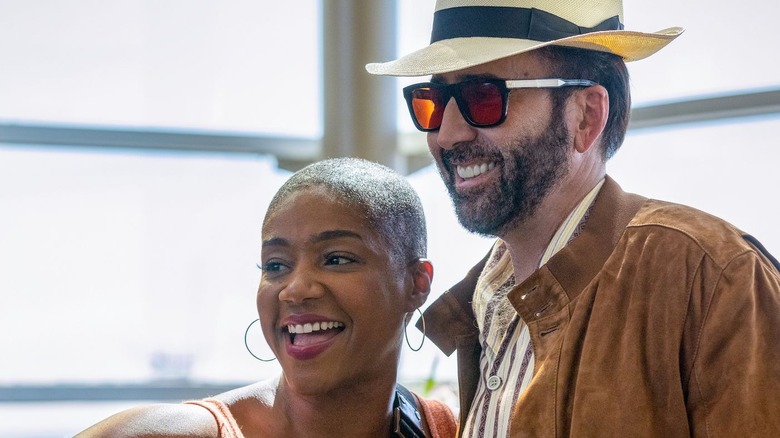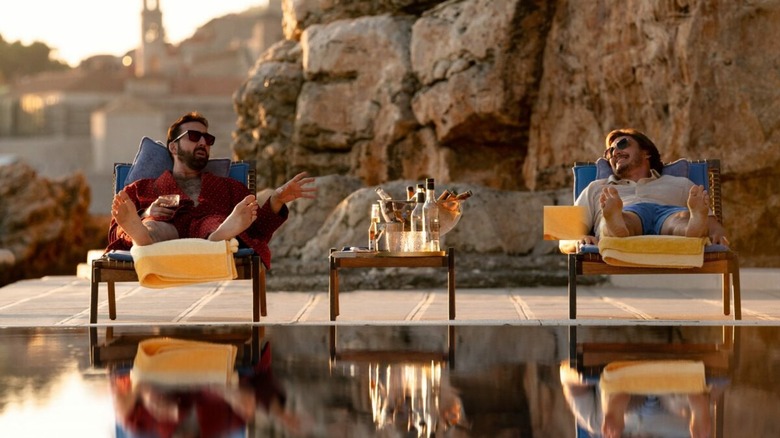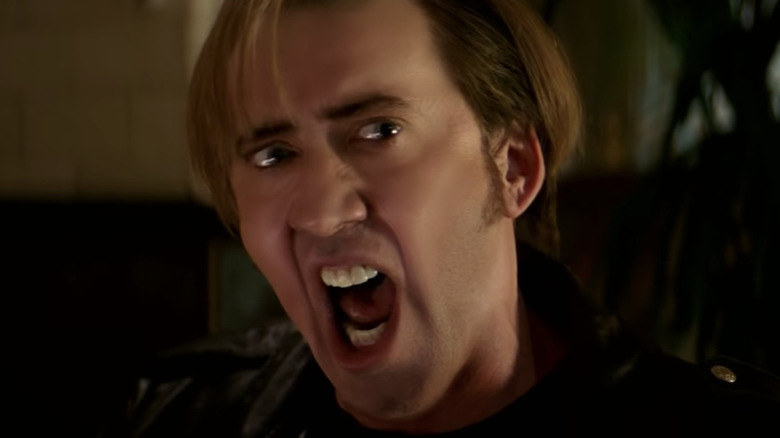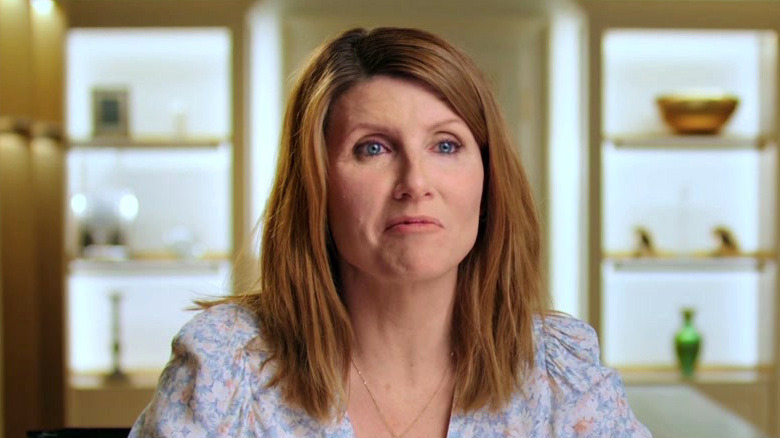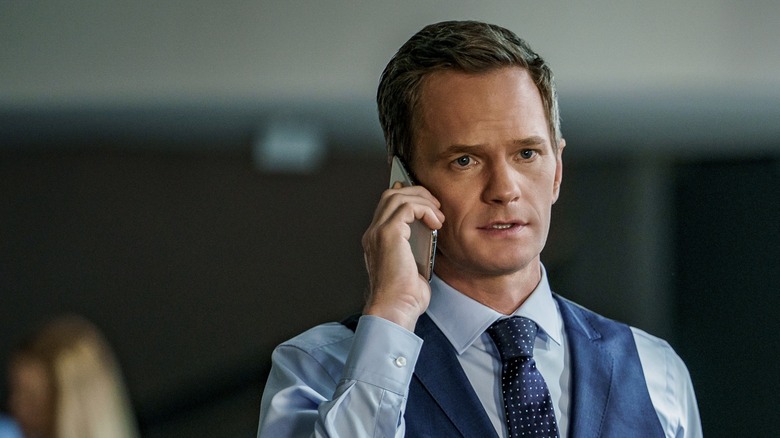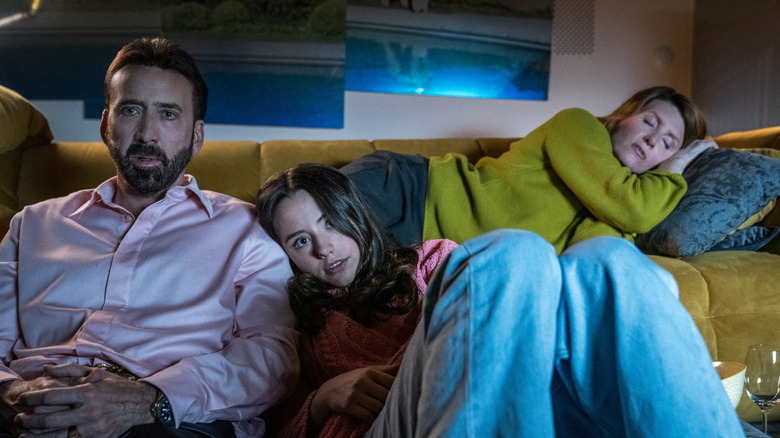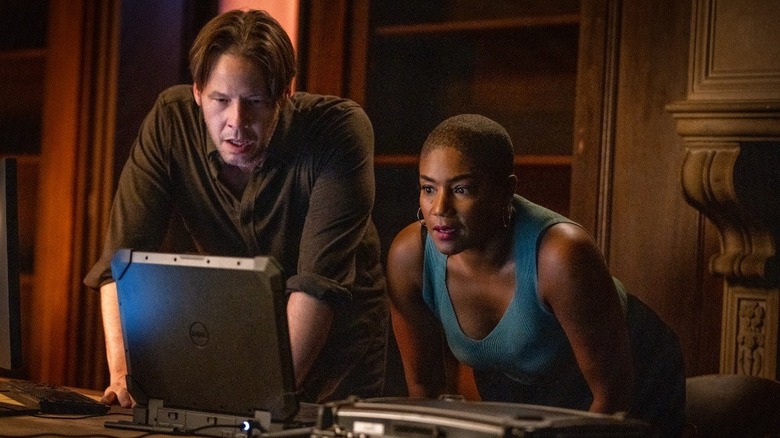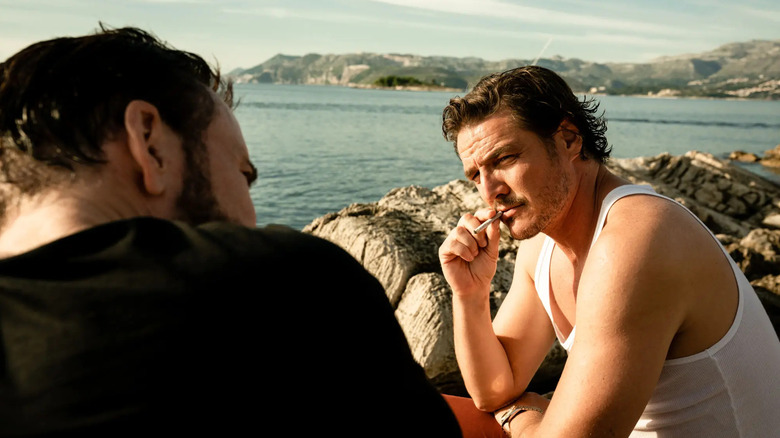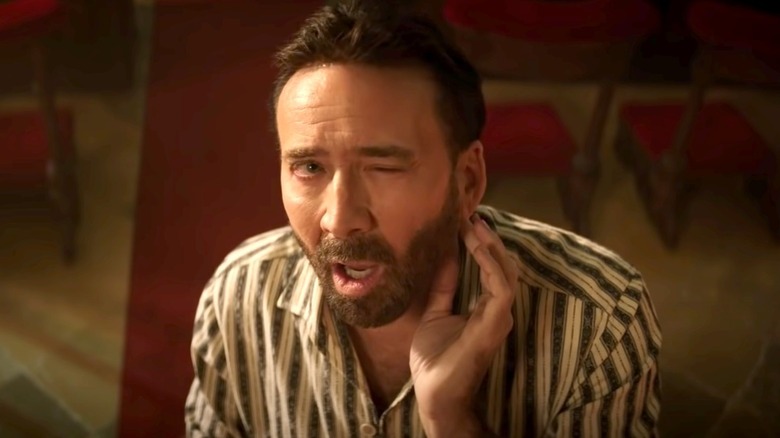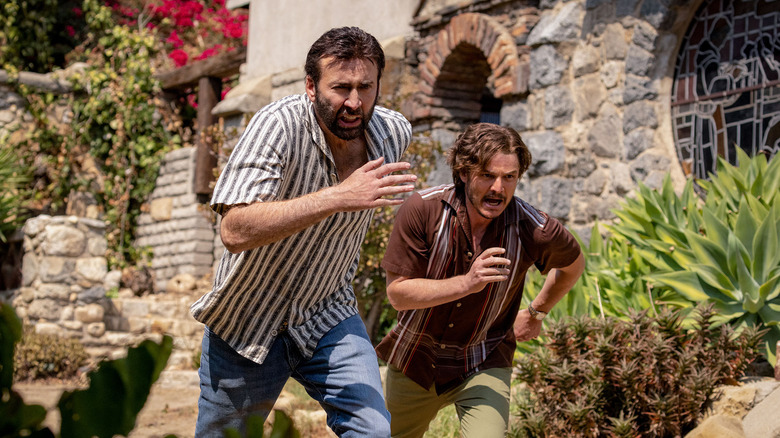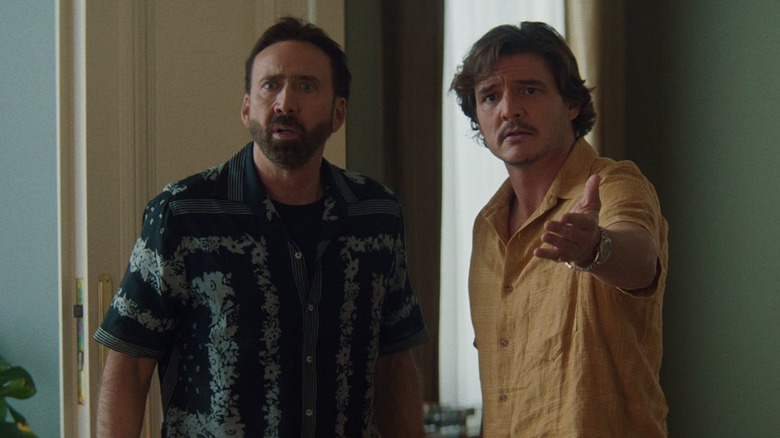The 6 Best And 6 Worst Things About The Unbearable Weight Of Massive Talent
"The Unbearable Weight of Massive Talent" has such an odd, long, and unwieldy title that people have taken to calling it "the new Nicolas Cage movie." That's definitely an apt description, as this intensely meta action-buddy-comedy revolves around Nicolas Cage playing Nicolas Cage at roughly the same age and same place in his career. Cage thinks of himself as both a serious actor and a movie star, but it's been a while since he's nabbed a role befitting of his stature. Not to mention, his personal life is in shambles and he owes a lot of people a lot of money.
That's when purported olive magnate and huge fan of Nicolas Cage, Javi Gutierrez (Pedro Pascal), contacts his agent with the easiest job offer ever ... a million dollars to play himself at Javi's birthday bash in Mallorca, Spain. At first, Cage is too proud to take the job, but as the well has dried up and the debts are coming due, he has little choice. Yet the equal parts awkward and charismatic Javi isn't who he says he is, and Cage gets caught up in a high-stakes criminal underworld plot to take down a foreign leader that also involves the United States government.
What transpires is an extremely watchable big swing of a movie that's as offbeat as it is broadly appealing and as reverential to its star as it is ready to roast him. But, like Nic Cage's resume, it's full of highs and lows. These are the six best and worst parts of "The Unbearable Weight of Massive Talent."
This article contains spoilers.
Best: the thoughtful Nicolas Cage references
Though the film debuted to largely positive reviews, critics have been somewhat split on the true purpose of "The Unbearable Weight of Massive Talent." Is it self-congratulatory fan service? Or is it meant to lovingly lampoon Nicolas Cage's scenery-devouring acting, overly dramatic persona, and too-prolific career? The vast majority of the jokes are made at Cage's expense with his full and knowing participation, which strongly indicates it's the latter.
"Massive Talent" opens with a clip from "Con Air" in which teenagers watch the action movie while getting high and describe Cage's performance as "awesome." Later, Pedro Pascal's Javi gives a passionate speech about how much the 1994 comedy "Guarding Tess" meant to him and his crime boss dad. Cage describes 2001's "Captain Corelli's Mandolin" as "underrated for sure." That the movies referenced here are not among Cage's best is telling. He was nominated for an Oscar for 2003's "Adaptation," and won for 1996's "Leaving Las Vegas," yet there's no direct mention of either film. Instead, the punchlines amount to humbling and accurate assessments of his diverse filmography.
But "Massive Talent" isn't mean-spirited toward its star. The alternating deflation and inflation of Cage strikes the perfect balance. Javi's secret shrine, for example, is both ridiculous and an appropriate, Easter egg-filled homage to a Hollywood legend. That scene features a well-deserved shout out to "Mandy" as well as props from iconic Cage films, like the diapers from "Raising Arizona."
Worst: the lazy Nicolas Cage references
"The Unbearable Weight of Massive Talent" risked being a one-joke movie, that joke being that Nicolas Cage is in a movie about Nicolas Cage being in movies. Thankfully, it uses its premise to go in some unexpected directions that have less to do with the actor and more to do with the state of the entertainment industry as a whole, as well as the problem of balancing one's personal dreams with family responsibilities. But now and then, the script gets a little lazy and reverts back to its original concept is the most basic way possible.
Tiffany Haddish and Ike Barinholtz play CIA agents Vivian and Martin. The two partners are stationed in Mallorca, they're waiting for a plane to land, and they assume their target Javi will be the one on the runway. Instead, Nic Cage exits the plane on his way to play "trained seal" at super fan Javi's extravagant birthday party. After some initial shock, Vivian and Martin have a back-and-forth radio conversation in which they discuss Nicolas Cage movies. Vivian says he's the guy from "Moonstruck" and "Croods 2" while Martin insists he's the guy from "Con Air" and "Face/Off."
There's nothing wrong, per se, with this type of namedropping. It does speak to the fact that different people know Nicolas Cage from different projects, based on the demographics they fit into, but the instances in which "Massive Talent" merely peppers in what feels like IMDb information work less well than the more nuanced use of his celebrity.
Best: Nicolas Cage and Pedro Pascal's chemistry
"The Unbearable Weight of Massive Talent" is as good as it is because of the on-screen chemistry between Nicolas Cage and Pedro Pascal. Their dynamic is among the best examples of a platonic love story in recent memory that the audience can't help but root for. It's a deceptively difficult double act to pull off. Cage is playing a fictionalized version of himself, but Pascal is playing a wholly imagined character and one that could have easily come off as a stereotype. While Cage is absolutely up to the challenge of embodying and then skewering a larger-than-life version of himself, Pascal has the harder job, and (as if he's happy simply not to be wearing a Beskar helmet) he nails it.
At the start, both characters are presented as unlikable. Cage is a self-absorbed dad. Javi is an uber-rich, potentially murderous mobster. There's also a seemingly insurmountable awkwardness inherent to their situation. Javi is so obsessed with Cage, he's paid a million dollars to hang out with him. Cage's star has faded enough that he accepted it. What transpires should be cringe-worthy. But instead, their friendship blossoms into something beautiful and aspirational. They're positively giddy as they gush about their favorite movies, go on (LSD-induced) adventures, and — in one of the film's most endearing scenes — try on each other's shoes. "Massive Talent" is about a lot of things, but it's mostly about two people being vulnerable with each other and clicking when it comes to the things that give their lives meaning.
Worst: the chemistry between Nicolas Cage and Nicolas Cage
Nicolas Cage has played multiple characters in movies before ("Face/Off" and "Adaptation") so it's a bit of an in-joke when "Nicky" shows up a few scenes into the movie. This macho, egotistical version of the actor has noticeably over-processed hair and digitally de-aged skin, wears a leather jacket, and communicates in Cage's patented whisper-then-scream mode of line delivery. It's clear the real Nicolas Cage doesn't want Nicky around. He gives terrible advice and his only concern is maintaining their status as an A-lister.
While the conceit could have been clever, Nicky isn't really developed enough as his own character, and his relationship with Nic isn't properly explored. Even if he had been given more substance and screen time, "Massive Talent" doesn't need him. He only appears in the few moments when the original Cage is having a crisis of confidence, and he really doesn't do anything besides cut himself down with insults before pumping himself up with feral howls of hubris. A scene in which Nicky kisses Nic to prove he's still cool and a "good smoocher" isn't just uncomfortable to watch, its point about actors' tendency toward self-obsession is too obvious and made better elsewhere in the movie. In fact, almost everything Nicky is intended to do (namely, hold a mirror to Nic's high expectations and insecurities) is accomplished in a smarter way by his conversations with his therapist, his daughter, his ex, and his new best friend, Javi.
Best: Sharon Horgan as Olivia, Nic's ex-wife
In a movie chock full of big performances, Irish actor Sharon Horgan turns in a masterfully calibrated, realistic portrayal of Nic Cage's most recent (fictional) ex-wife, Olivia, with whom he shares a 16-year-old daughter, Addy. Olivia has enough tenderness for Cage that when we first meet her, we don't realize they're divorced. Only when Cage's agent reminds him that he's stacked up debts from alimony and living in a swanky hotel for the past year do we understand the extent to which their relationship has gone sour. She's frustrated by him. She's concerned for him. She wants him to be a more attentive dad and put-together person. But she's moved on with her life and she's accepted that he probably won't change.
Not only is Horgan impressively grounded as one of the only believable people in "Massive Talent," she's also really funny. Her propensity for casual swearing is sort of charming. Her secondhand embarrassment when a drunk Cage decides to sing and play the piano at their daughter's birthday party is palpable and immensely relatable. And when the character-driven film morphs into car chases and shoot-outs in its final act, she makes the transition to woman-in-an-action-movie with ease (and just the right amount of satirical wink). Wife and mother characters are often among the most poorly written in any script. "Massive Talent" gives Horgan a decent start by giving her a little more pathos than usual, but she elevates what could have been a throwaway role.
Worst: Neil Patrick Harris as Nic's agent
Neil Patrick Harris is almost always a delight to see on screen, especially when he pops up in cameos that poke fun at his own Hollywood history. But here, he's miscast as Nicolas Cage's smarmy agent, Richard Fink, who struggles to talk honestly to the star about his diminishing prospects and has a high pain tolerance for extreme massage. It's not that Harris is bad. It's just that he's too famous for the role and he's done this kind of thing before.
It's easier for the audience to buy Nicolas Cage as Nicolas Cage operating in and among non-celebrities if that audience doesn't know those actors by name. Harris, however, has headlined three hit TV series, starred in multiple films and Broadway plays, won many awards, and has even hosted numerous award shows. It's a bit of a stretch to imagine him as a hustling B-list agent. That there's no hair and makeup attempt to disguise his identity makes it hard to separate the actor from the character, taking the viewer out of the otherwise immersive movie for a moment when he first appears in the frame.
Fink as written also hews a little too close to the kind of jerks Harris sometimes plays to subvert his Doogie Howser good guy image. Like Cage, he portrayed a fictionalized version of himself in "Harold and Kumar Go to White Castle" at about the same register. Nic Cage and "Massive Talent" probably would have been better served by another Richard Fink.
Best: the entertainment industry in-jokes
There are Nic Cage-specific jokes aplenty in "Massive Talent," but there are even more (and even smarter and funnier) observations about the inner workings of the entertainment industry and the state of movies in the 21st century, which any film artist or movie lover will appreciate.
Cage is desperately trying to land what he thinks will be a comeback role (though he constantly assures himself and us that he hasn't gone anywhere). First, he implies he's too big a deal to read for the part, then agrees to an audition, then does a terrifyingly intense cold read inches away from a producer's face as he's trying to leave. When he loses out and considers retiring, he gives an overblown but sincere statement about the honor of having been a small part of "storytelling and mythmaking." Similarly, Javi sends his screenplay to Fink in hopes that Cage will read it. Fink promptly throws it in the trash.
After Addy mistakenly thinks Humphrey Bogart was a porn star, Cage tries to force his passion for film onto his daughter with a screening of the 100-year-old German film (and cinephile favorite) "The Cabinet of Dr. Caligari." He finds a kindred spirit in Javi, though, who also loves "Caligari." They discuss their favorite movies and Javi turns Cage onto "Paddington 2," which becomes one of the film's best running jokes. More evidence that Cage views the world through the lens of movies: he explains to an incensed Vivian that his dropping acid with Javi was a "Donnie Brasco-type situation."
Worst: the spy plot
Most of the plot of "The Unbearable Weight of Massive Talent" plays out entertainingly and sensibly enough, but the CIA's utilization of Nicolas Cage as an inside man is probably the weakest element. The ostensible reason for the story to be happening at all is that Javi has kidnapped the president's daughter in order to negotiate his withdrawal from the ballot in an upcoming election, so that a more cartel-friendly candidate can win. The CIA is there to rescue the girl and prevent this.
Vivian stashes the tracking device she intended to plant on Javi in Cage's pocket instead, then she and Martin show up to recruit him. His ability to read people from his acting classes tells him Javi's really a good guy, but he also relishes the chance to use his skills for "spycraft." It's too bad Martin and Vivian aren't very capable agents. She irresponsibly texts completely uncoded messages to Cage's personal cell phone, and the actual missions they send him on are stagey and pointless.
In an unexpected and tonally bizarre scene just before the film's climax, Martin and Vivian are shot dead in a showdown with Lucas (Javi's cousin and the real crime boss) and his men. "Massive Talent" never concludes its espionage thriller storyline; it just jumps straight to the premiere of the movie within a movie. All of this could very well be commentary on how many action movies are rife with plot holes, but in this actual movie, these poorly thought out and missing details leave the audience wondering.
Best: the cliff scene
Though "The Unbearable Weight of Massive Talent" aims to come together in its meta finale, a much earlier scene serves as a better distillation of the project's thesis. Before the CIA informs him that Javi is a ruthless maniac, Cage just thinks he's an obligation. He wants to lounge in bed until the mandatory party appearance, but Javi — who's paying him for his company — wants to drive along the cliffs instead. At one point, he pulls over and runs through some brush as if someone dangerous is chasing him. For a moment, the audience thinks this is the spy plot interrupting the buddy comedy, but Cage quickly deduces that this is a performance and Javi's ploy to lure him out of retirement.
After doing some semi-autobiographical improv, Javi convinces Cage to join in and act just for fun, there at the rocks' edge. Cage rediscovers his love of his craft, then the scene partners close out the bit by jumping off a very high cliff for real. Cage remarks that they could have died, but the cliff jump makes him feel alive again and establishes his bond with Javi. The scene is ingeniously written, with precisely the right amount of ham and wit. It's exciting, surprising, funny, touching, gorgeously shot, and unlike anything in any other movie. A line in which a found-out Javi breathlessly asks, "Stanislavski? Is he part of the resistance?" will be particularly hilarious to actors.
Worst: the ledge scene
Immediately after Nic Cage returns from his splendid day out with Javi, he's accosted by Martin and Vivian, set up with an earpiece and some gear, and sent back to Javi's party with instructions to extract information from a highly secure control room. Part of that gear is a chemical adhesive strip that knocks out anyone it touches within 30 seconds. When Carlos, Javi and Lucas's guard, starts to tail Cage, Vivian tells him to hide and slap Carlos with the chemical. But Cage accidentally touches his forehead and sedates himself. There's an antidote in the control room, but unfortunately, he's locked himself out. The CIA probably should have expected such sloppy spying from a novice, and the setup could have had a funny and fitting payoff, but the scene that follows is cheesy and inconsistent with the rest of the movie's level of sophistication.
The chemical that's supposed to incapacitate Cage within 30 seconds simply doesn't. Vivian challenges the merely sleepy and numb actor to climb out of one window, creep along a ledge three stories up, then climb back into another window and administer the antidote in the form of a syringe, all while Carlos is in the room. This sequence happens exactly as the audience would expect in a much lesser comedy. The physical gags don't really work, and the idea that an impaired 58-year-old man would be able to accomplish the ledge shimmy strains belief, when elsewhere the movie shows how these kinds of episodes would really play out.
Best: the triple meta story
Nicolas Cage has gone meta before in "Adaptation," where he played a fictionalized version of screenwriter Charlie Kaufmann (and his fictional twin brother) as he adapts a dry book about rare orchids into a more accessible screenplay. "The Unbearable Weight of Massive Talent" ups the ante and is meta on three different levels. For the most part, the film manages to be hyperaware without being condescending or too proud of itself.
In casting Nic Cage, an actor who admittedly could "be a little more strategic in [his] choices" and who really did take straight-to-video jobs to get out of debt, "Massive Talent" is making its own myth out of someone who's simultaneously a legitimate movie star and a meme. When the plot pivots to Cage and Javi's efforts to brainstorm a script, the result is a snappily-paced and highly entertaining story within a story, plus a pretty astute assessment of modern commercial storytelling.
"Massive Talent" has the most fun being meta by giving its stars in-world acting opportunities. While they're tripping, they decide to include a drug scene and a paranoid subplot. Seconds later, they suspect two random strangers on a bench are watching them. In one of Pascal's standout moments, Javi tries and fails to laugh naturally, then the duo attempts to scale a not-very-high wall as if their lives depend on it. The ensuing dialogue is a great example of how "Massive Talent" both pokes fun at and adores movie tropes.
Worst: the too-neat ending
At various moments in "Massive Talent," the audience might be able to guess where things are headed. Some reveals — Javi's massive Cage-abilia collection, Olivia and Addy's visit to Mallorca, and the fact that Lucas is the real villain — are mildly surprising at best, but don't hamper the movie. Other developments — such as Javi's admission that he knows Lucas was a kidnapper and Olivia's prosthetic makeover of Cage — are slightly less predictable. Still other moments — the cliff jump, the shoe swap — come entirely out of left field. The mix of cliché and inventive story choices means that, as the film hurtles toward its conclusion, even a screenwriting-savvy viewer might genuinely wonder how it will all end.
"Massive Talent" briefly teases the possibility that Cage really did get that life-changing part and we're watching the movie he auditioned for. The vibe is madcap enough that other non-happy-ending possibilities remain: Cage, or Javi, could die trying to be a real-life hero. Instead, the film ties things up just a bit too tidily. Cage gets his family back. Javi gets his girl. They get to make their movie (with Demi Moore and an American flag billowing in the background), which premieres to a standing ovation. Then Cage watches "Paddington 2" with Addy. It's a fine ending, and its meta nature is about as well-handled as it could be, but it lacks just a little of the film's gleeful messiness and boldness.
